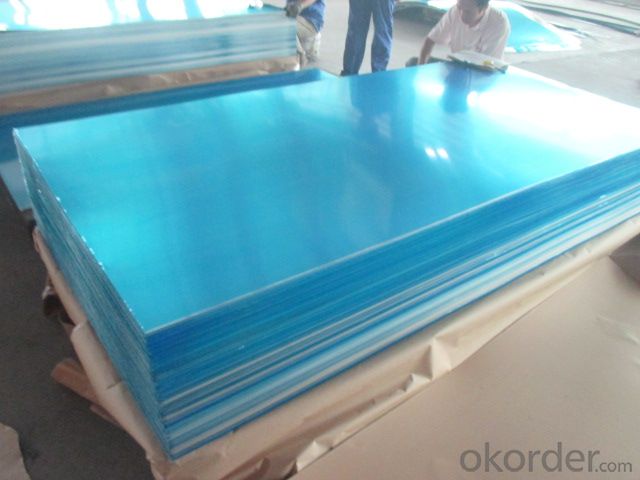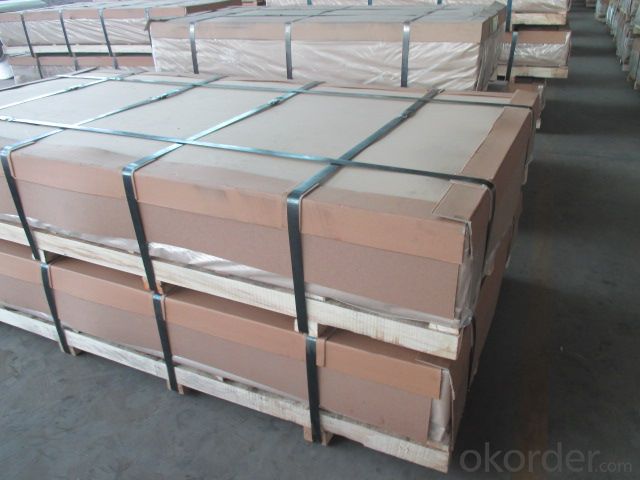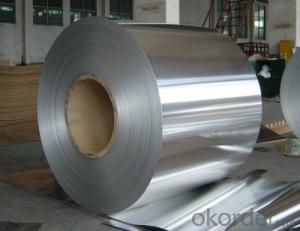Color Coated Aluminium Coil For Roofing and Ceiling
- Loading Port:
- Tianjin
- Payment Terms:
- TT OR LC
- Min Order Qty:
- 2 m.t.
- Supply Capability:
- 80000 m.t./month
OKorder Service Pledge
OKorder Financial Service
You Might Also Like
Item specifice
Color Coated Aluminium Coil For Roofing and Ceiling
Description
Alloy | 1060, 1100, 3003, 8011, etc. |
Temper | H16, H18, H24, H26, H28 |
Thickness | From 0.05mm to 3.0mm |
Width | Standard width:1240mm |
Special width:1300mm, 1520mm, 1570mm, 1595mm | |
Diameter | Standard dia:1200mm |
Interior dia:150mm,405mm,505mm | |
Weight | 2.5 T/coil,3.0 T/coil |
Coating | PE, PVDF, ACRYLIC |
Surface | Embossed, mill finish, coated |
Color | AS to code RAL |
Gloss | 10-90%(EN ISO-2813:1994) |
Coating Thickness | PE: more than 18 micron |
PVDF: more than 25 micron | |
Coating Hardness(pencil resistance) | More than 2h |
Coating adhesion | 5J (EN ISO-2409:1994) |
Impact Resistance | No peeling or cracking(50 kg/cm,ASTMD-2794:1993) |
Flexibility(T-bend) | 2T |
MEK resistance | More than 100 |
Advantage | 1.High temperature resistant 2.Weathering resistant 3.Scrubbing resistant 5.Acid or alkali proof 6. Fireproof 7.Light weight material is easy to construct and install |
Out package | Wooden splint with export standard |
Application | ACP, wall cladding, facades, roofs and canopies, ceilings, signboards, blind window, display platforms, electrical panels, etc |


Manufacturing
Decoiler → Accumulator →Tension Leveler →Acid & Alkali Cleaner → Rinse →Conversion Treatment → Priming coater →Infrared Curing Oven →Main coater →Floatation Curing Oven →Strippable Film Applicator → Exit Accumulator → Recoiler
PVDF and PE Coated Aluminium Coils/Sheets
PVDF color pre coated aluminum coils/ sheets:
It is well known that fluorocarbon lacquer coating (PVDF coating) owes the best acid resistant/alkali and temperature tolerant capabilities of all painting materials. Being the best quality of precoated aluminum, PVDF coated coils are especially suitable for outdoor roofing walls and ceiling manufacturing.
Polyester (PE) color pre coated aluminum coils/ sheets :
Using high-grade polyester lacquer coating material, the finished coated coils are with delicate color uniform texture, color and diverse. It is the most popular and most common used materials in decorative usage. The PE coated aluminum are widely used in ACP( aluminum composite panel ) production and indoor ceiling usage.
FAQ
--Q: Do you provide free samples?
--A: Yes, free samples will be sent to you on freight at destination.
--Q: Can I get your latest products catalogue?
--A: Yes, it will be sent to you in no time.
--Q: What is the MOQ?
--A: 2 tons
--Q: What are your payment terms?
--A: We accept L/C, T/T.
--Q: What kinds of alloy can you supply?
--A: 1000 series: 1050, 1060, 1070, 1100, 1145, 1200
3000 series: 3003, 3004, 3105, 3104
5000 series: 5052, 5083, 5754, 5182
6000 series: 6061, 6063, 6062, 6063
8000 series: 8011, 8021
--Q: What kinds of temper can you supply?
--A: O-H112: O,H12,H14,H16,H18,H22,H24,H26,H,32,H34,H111,H112
T3, T4, T6
- Q:Are aluminum coils suitable for insulation jacketing?
- Indeed, insulation jacketing can be effectively achieved with aluminum coils. Renowned for their exceptional thermal properties, durability, and resistance to corrosion, aluminum coils are a highly favored choice for jacketing material. They find extensive application across diverse industries such as HVAC, oil and gas, and petrochemical, where they serve to insulate pipe systems and equipment. By enveloping insulation materials, aluminum coils play a crucial role in safeguarding against moisture infiltration and sustaining thermal efficiency. Moreover, their lightweight composition ensures effortless installation and transportation. Ultimately, aluminum coils emerge as a dependable and efficient solution for insulation jacketing endeavors.
- Q:Can aluminum coils be used in cryogenic applications?
- Yes, aluminum coils can be used in cryogenic applications. Aluminum is known for its excellent thermal conductivity, which makes it a suitable material for transferring heat in low-temperature environments. Additionally, aluminum has a low coefficient of thermal expansion, meaning it can withstand the extreme temperature changes that occur in cryogenic applications without experiencing significant dimensional changes. However, it is worth noting that aluminum coils may need to be specially designed or treated to ensure they can withstand the extremely low temperatures and avoid any potential issues such as brittleness or embrittlement.
- Q:Can aluminum coils be used for electrical connectors?
- Certainly! Electrical connectors can indeed utilize aluminum coils. This metal, widely employed for electrical connectors, boasts exceptional electrical conductivity, a relatively affordable price, and lightweight characteristics. It finds extensive application in diverse electrical domains such as power transmission, distribution systems, electrical motors, and transformers. Nonetheless, it is crucial to prioritize adequate insulation and protection for the aluminum coils to avert corrosion and guarantee enduring dependability for the electrical connections.
- Q:How are aluminum coils tested for quality control?
- Aluminum coils go through numerous quality control tests to ensure their reliability and performance. One primary test is the dimensional inspection, where the coils' physical dimensions are measured and compared to the manufacturer's specifications. This helps identify any discrepancies in length, width, thickness, or diameter. Another critical test is the visual inspection, where the coils are thoroughly examined for surface defects like scratches, dents, or discoloration. This visual examination is crucial to ensuring that the coils meet the required aesthetic standards. To evaluate the mechanical properties, various mechanical tests are conducted. Tensile strength tests measure the coils' resistance to breaking under tension, determining their durability and strength. In addition, hardness tests assess the coils' resistance to indentation or deformation. The hardness values are compared to predetermined standards to verify if the coils meet the necessary criteria. Corrosion resistance testing is also conducted to assess the coils' ability to withstand corrosion over time. This test exposes the coils to harsh environments or corrosive substances, which is crucial as aluminum is often used in applications that may involve contact with corrosive elements. Electrical conductivity tests ensure the proper functioning of the coils in electrical applications. Conductivity is measured and compared to the required specifications to guarantee that the coils possess the desired electrical characteristics. Additionally, depending on the specific requirements of the aluminum coils, other tests like chemical composition analysis, surface roughness evaluation, and coating adhesion tests may also be performed. Overall, these comprehensive quality control tests enable manufacturers to ensure that aluminum coils meet necessary standards, ensuring their quality, performance, and reliability in various applications.
- Q:which metal is very common today and which one will be most common in future. steel or aluminum
- aluminum will be most commonly use in the future because it is lightweight. But metal is still the most commonly used today.
- Q:I need to make aluminum powder that is fine! I don't have a mill to use or something like that. If I fill literally the whole coffee blender, will that get it fine? I want to make an ok amount of it. I tried to use sand paper which makes it as fine as I want it but takes a while of sanding.
- How To Make Aluminum Powder
- Q:Are aluminum coils suitable for roofing?
- Yes, aluminum coils are suitable for roofing. Aluminum is a lightweight and durable material that is resistant to corrosion, making it an excellent choice for roofing applications. It is also highly reflective, which can help to reduce energy costs by keeping the building cooler. Additionally, aluminum coils are easy to install and maintain, making them a popular option for both residential and commercial roofing projects.
- Q:Can aluminum coils be used for electrical transmission lines?
- Yes, aluminum coils can be and are commonly used for electrical transmission lines. Aluminum has several advantages that make it a suitable choice for transmission lines. First, aluminum is a lightweight material, which makes it easier and more cost-effective to transport and install. Second, aluminum is a good conductor of electricity, with similar conductivity to copper. Third, aluminum is less expensive than copper, making it a more economical option for long-distance transmission lines. However, there are some challenges associated with using aluminum coils in transmission lines. Aluminum has a lower tensile strength compared to copper, which means that it is more prone to sagging over long distances. Additionally, aluminum has a higher thermal expansion coefficient than copper, which can cause issues with thermal expansion and contraction. Despite these challenges, proper design and engineering can ensure that aluminum coils are used effectively and efficiently in electrical transmission lines.
- Q:How are aluminum coils used in the production of electrical conductors?
- Due to their excellent electrical conductivity and lightweight properties, aluminum coils find wide application in the production of electrical conductors. Typically manufactured from high-grade aluminum alloy, these coils ensure optimal electrical performance. To achieve the desired shape and dimensions of the electrical conductor, the production process involves initially forming the aluminum coils into thin, flat strips. These strips then undergo further processing using techniques like rolling, annealing, and drawing. After processing and forming, a thin layer of insulating material, such as enamel or varnish, is applied to the aluminum coil. This coating serves to prevent electrical leakage, ensure proper insulation, and protect against corrosion and environmental factors. The high conductivity and efficient electrical current-carrying capacity of aluminum coils make them commonly used in the production of electrical conductors like wires and cables. They are particularly favored in industries where weight is a crucial consideration, such as aerospace and automotive. Moreover, aluminum coils offer cost advantages over alternative materials, making them a popular choice for electrical conductor production. Their lightweight nature also facilitates easier installation and handling, reducing labor costs and time. In conclusion, aluminum coils are essential in the production of electrical conductors, providing excellent electrical conductivity, lightweight properties, and cost advantages. Their versatility and efficiency make them the preferred choice in various industries where electrical conductivity is of utmost importance.
- Q:Are aluminum coils resistant to oil and grease?
- Aluminum coils typically possess resistance against oil and grease. They exhibit a natural ability to resist corrosion and are not easily influenced by most solvents, including oil and grease. This characteristic renders aluminum coils a suitable option for diverse applications that involve potential contact with oils or greases, such as the automotive and HVAC sectors. Nevertheless, it is crucial to acknowledge that extended exposure to particular aggressive chemicals or high concentrations of oil or grease may gradually result in damage or deterioration of the aluminum coils. Consequently, it is advisable to diligently clean and maintain the coils to guarantee their optimal functioning and durability.
1. Manufacturer Overview |
|
|---|---|
| Location | |
| Year Established | |
| Annual Output Value | |
| Main Markets | |
| Company Certifications | |
2. Manufacturer Certificates |
|
|---|---|
| a) Certification Name | |
| Range | |
| Reference | |
| Validity Period | |
3. Manufacturer Capability |
|
|---|---|
| a)Trade Capacity | |
| Nearest Port | |
| Export Percentage | |
| No.of Employees in Trade Department | |
| Language Spoken: | |
| b)Factory Information | |
| Factory Size: | |
| No. of Production Lines | |
| Contract Manufacturing | |
| Product Price Range | |
Send your message to us
Color Coated Aluminium Coil For Roofing and Ceiling
- Loading Port:
- Tianjin
- Payment Terms:
- TT OR LC
- Min Order Qty:
- 2 m.t.
- Supply Capability:
- 80000 m.t./month
OKorder Service Pledge
OKorder Financial Service
Similar products
New products
Hot products
Related keywords





























